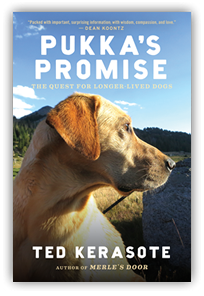Healthy Dogs
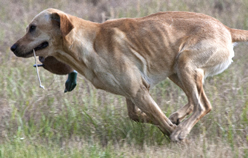 In the months following the publication of Merle's Door, I received hundreds of emails from readers who had lost beloved dogs and closed their letters with a variation on this theme: "Why must our dogs die so young?"
In the months following the publication of Merle's Door, I received hundreds of emails from readers who had lost beloved dogs and closed their letters with a variation on this theme: "Why must our dogs die so young?"
Naturally, when most of us say this, we're not expecting an answer. We're expressing a rhetorical complaint: "Why do our best friends in the animal kingdom live so much such shorter lives than we do, only about an eighth of the normal life expectancy of a person in the developed world?"
However, I also received another question from many readers, which was more particular in its nature and much more heartrending: "Why did my dog have to die of cancer at three years old...at four...at six?" "Why," as one person wrote, "have four of my five Golden Retrievers died of cancer?"
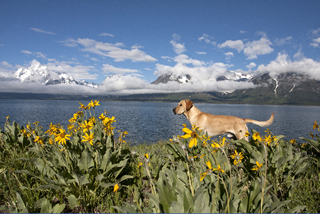 What are the key elements of having a long-lived, healthy dog? Here are some pointers.
What are the key elements of having a long-lived, healthy dog? Here are some pointers.
One of the best sources of information on keeping dogs healthy is Dr. Karen Becker's archives of Pet Health Articles.
Contaminants
Don't expose your dog to environmental pollutants, particularly the herbicides and pesticides that are applied to lawns and golf courses.
Nutrition
Rotate your dog's food on a weekly or monthly basis. Would you be healthy if you ate the same thing your entire life? Reduce the carbohydrates your dog eats (corn, oats, soy, barley, rice) and replace it with high-quality protein.
Helpful Links: The recommendations of an increasing number of veterinarians as summarized by Dr. Marty Goldstein and Dr. Karen Becker.
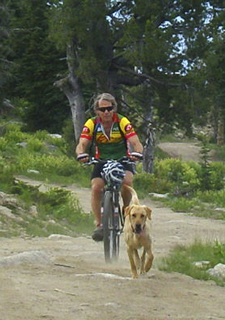 Vaccinations
Vaccinations
Once your dog has gotten its course of vaccinations and boosters, eliminate yearly vaccinations except those required by law (rabies) and those that are recommended by your veterinarian for your area. If your veterinarian says that a full round of yearly boosters is a must (e.g., parvovirus, distemper, adenovirus, kennel cough, leptospirosis) get a second opinion.
Helpful Links: Dr. W. Jean Dodds Vaccine Protocol
Vaccinations 101: Dr. Ron Schultz shares his vast expertise in vaccines with dog owners.(HEALTH): An article from: Whole Dog Journal
Genetics
If you're looking for a new dog and are getting one from a breeder take a close look at the dog's family tree, finding out how long its ancestors lived and what they died of. Case in point: 61.4 percent of Golden Retrievers in the United States die of cancer (http://www.grca.org/pdf/health/healthsurvey.pdf, p. 142). Researching your pup's ancestry before you even lay eyes on it can save a great deal of heartache a few years down the road. Take Dr. Karen Becker's 18-Point Assessment of a breeder and his or her facility before committing to a pup.
Spaying and Neutering
There is a growing body of scientific evidence that points to the harmful effects of spaying and neutering: shortened life span, increased risk of certain cancers, and increased incidence of ACL injuries. Depending on your situation, you may wish to delay the spaying or neutering of your dog until it is 14 months old or not sterilize it at all. If you're worried about not being able to control your dog when it becomes sexually mature, consider a vasectomy or ovary-sparing spay, which will prevent your dog from becoming a parent, but retain the beneficial effects of the dog's sex hormones.
Helpful Links: "Long-Term Health Risks and Benefits Associated with Spay/Neuter in Dogs", by Laura J. Sanborn
Gerald P. Murphy Cancer Foundation - Ovaries & Longevity
A good scientific overview on spay/neuter
To find a vet that performs ovary-sparing spays or vasectomies, see this state-by-state and provincial listing. Not all states and provinces are listed, as we were unable to find vets who perform these procedures in every state and province.
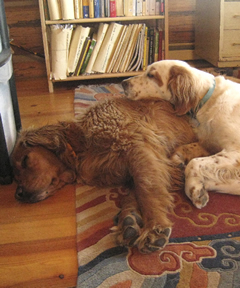 Prevention
Prevention
Run your hands over your dog every day. The instant you feel a lump take your dog to your vet and get the lump aspirated and an analysis made of its contents. If your veterinarians says, "Let's watch it," find a new vet. Tens of thousands of dogs needlessly die of cancer each year because their humans "watched" a lump that could have been easily removed before the cancer metastasized.
What do I do if my dog gets cancer?
When humans get cancer, they seek specialized care. So, too, should it be with dogs. For advanced cancer care go the the American College of Veterinary Internal Medicine's website and search for an oncologist in your area by using the pop-down menu.

